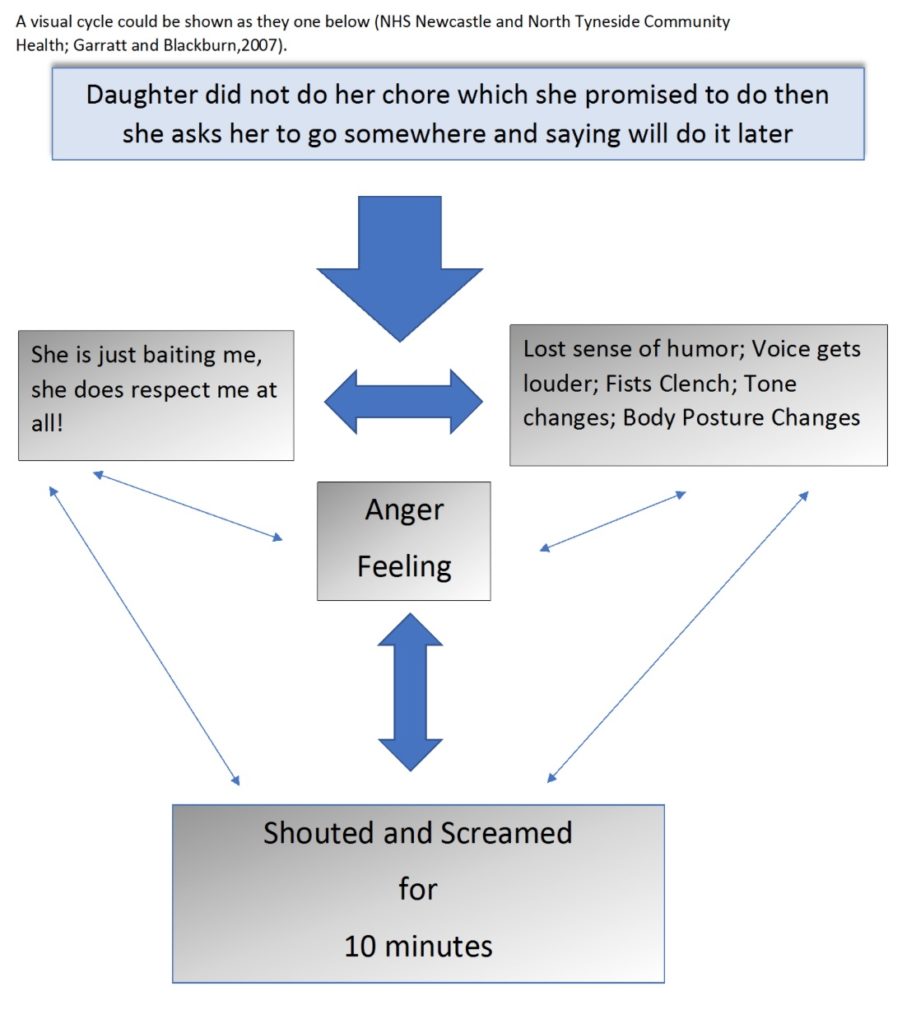Anger Management: Finding Peace During the Storm
Christian Counselor Spokane
Bob and Jane (names changed) came into my office several years ago reporting that though they loved each other, Bob’s anger was causing problems in the relationship.
The cycle would start with a word or a look from Jane or the children. Bob would confront the action or inaction, then within seconds, it would escalate into a huge explosion followed by awkward silence and everyone scrambling to their rooms.
 Bob knew his anger was bad but rationalized his anger behavior as “That’s just who I am. I have my Dad’s temper.” Even though Jane loved Bob, after many years of explaining him, consoling the kids, and “fixing” relationships which were affected by his temper, she was exhausted. Her words were ones that I had heard before: “It just feels like we always have to walk on eggshells in our house.”
Bob knew his anger was bad but rationalized his anger behavior as “That’s just who I am. I have my Dad’s temper.” Even though Jane loved Bob, after many years of explaining him, consoling the kids, and “fixing” relationships which were affected by his temper, she was exhausted. Her words were ones that I had heard before: “It just feels like we always have to walk on eggshells in our house.”Bob knew his anger was hurting his relationships with those closest to him. He knew how friends, co-workers, and family had tried over the years to help him. He even went to a Bible study and tried to let God help him, but to no avail. Now, many years later, he was finding himself in counseling, hoping that Jane would stay with him but unsure how to stop his anger.
This story also happens frequently: A mother and father bring in their child and state that he is constantly angry and easily annoyed. As the months and years have dragged on; their child’s anger has grown into a wedge which has pulled the parents apart. Feeling helpless and frustrated their exasperation was seen in their faces. They were clearly at their wit’s end in knowing how to help him.
Teachers, as well as neighborhood friends and church friends, had all come to them and expressed that they were avoiding play dates or that they were frustrated at his lack of self-control in the classroom. At this point, these parents dreaded any conversation which started with, “I need to talk with you about Joe…”
Mary came into my office stating that she had come from a divorced family where the mom and dad engaged in many heated arguments in their home. As a result, since she was a teenager, she had her own problems with anger. Every relationship in her life was affected by her quick temper, critical spirit, and temperamental way of handling conflict.
She now felt alone and isolated from many people due to her outbursts and “flying off the handle” way of dealing with stress and disagreements. On top of this her longtime boyfriend who she thought she might marry, left her stated that her temper and argumentative nature had ruined their relationship and that he no longer loved her or saw a future for the two of them because he “never knew what to expect” when they were together.
If any of these situations remind you of yourself or someone you know, this article may be what you need to push you to get help or prompt you to talk to someone in your life who you love, but whose anger makes it hard to have a healthy relationship with them.
In each of the examples above, the person with the anger did not want to be angry but felt as if anger controlled them. The good news is we can control anger and we can get our life and relationships back into a healthy rhythm.
First off, what is anger? According to the Department of Health and Human Services (Reilly, Shopshire, Durazzo, and Campbell, 2015), “Anger is a normal feeling that we all experience. It is an instinctive response to feeling threatened.” Anger can be positive in that it can alert you that you are being hurt, physically or emotionally. It also let us know that our needs are not being met.
 Scripture tells us in Ephesians 4:26ff. “Be angry, and not sin:” do not let the sun go down on your wrath, nor give place to the devil…Let no corrupt word proceed out of your mouth, but what is good for necessary edification, that it may impart grace to the hearers… Let all bitterness, wrath, anger, clamor and evil speaking be put away from you, with all malice. And be kind to one another, tender-hearted, forgiving one another, even as God in Christ forgave you” (NKJV).
Scripture tells us in Ephesians 4:26ff. “Be angry, and not sin:” do not let the sun go down on your wrath, nor give place to the devil…Let no corrupt word proceed out of your mouth, but what is good for necessary edification, that it may impart grace to the hearers… Let all bitterness, wrath, anger, clamor and evil speaking be put away from you, with all malice. And be kind to one another, tender-hearted, forgiving one another, even as God in Christ forgave you” (NKJV).
Anger in and of itself is not bad or good It is what we do with our anger which determines its quality. We also know from the Scriptures that Jesus Himself was angered in the temple with those who were stealing and cheating those who came to offer their sacrifices for the Passover.
There are many words which describe or relate to anger:
- Anger is the emotional response to a threat, injustice, hurt or frustration where the desire is to confront or damage the source of this feeling.
- Bitterness is dwelling on anger or angry thoughts about a person or events in life which have caused frustration or loss.
- Hostility is a belief that someone else or other people are threatening to you and when an event or a person/s behavior towards causes one to feel that the world is unjust.
- Aggression is a behavior which causes physical or emotional damage to protect oneself or loved ones from harm or anticipated harm.
Anger in the moment causes us to experience the illusion that we have power over the person or situation and that we are justified in our actions towards others. Anger is usually empowered by fear. The fear is the fear of losing control or the fear of losing something.
This “something” can be a person, a job, a sense of stability, a relationship, a place in the community, the health of ourselves or others, or our status within society, to name a few. Anger can be something which is good, but as stated above, when it causes us to hurt ourselves or others we can trap our hearts in a pattern of bitterness and resentment that shuts every person out in our lives, and ultimately, even God, himself.
Anger Triggers
So, how can one be able to be angry but not sin? The first step is to figure out what triggers our own behavior. Once this is done, we can anticipate possible angry situations and can plan to use a positive strategy to react in a healthier way.
Here are some possible anger triggers:
- Stress, frustration, and disappointment: This is when you try to perform or fix something, but you are blocked from obtaining it or are disappointed by people or the outcome.
- Annoyances, irritations and resentments: These are things that “get on your nerves.” Examples of these are: Someone making a nuisance of themselves, breaking something that you care about, accidentally tearing a piece of clothing or favorite item, and loud noises or interruptions when you are busy.
- Abuse: This can be verbal, physical, mental, or sexual abuse. Sometimes this abuse is direct, sometimes it may be subtle like someone trying to trick you or make you feel foolish or wrong. It can also be a type of abuse which is an isolated incident or abuse which is delivered over a long period of time. This can reduce our tolerance level and can trigger outbursts when anything occurs which reminds us of the abuse.
- Trauma: Anger can occur when the emotions have been destabilized by some sort of physical, emotional, or mentally traumatic experience such as loss, accident, abuse, war, or anything else that may be considered trauma.
- Injustice or unfairness: Anger may be related to a sense of injustice or can act as a defensive mechanism to keep people away or at a safe, emotional distance. This occurs in situations where one is being treated unfairly or even feels that this is so. It could be as simple as someone not keeping a promise or even feeling someone else is being mistreated.
- Lack of Healthy Boundaries: Examples of this are: Allowing someone to take as much as they can from you; letting others define you or believing that others can anticipate your needs; expecting others to fill your needs automatically; allowing others to define your physical or sexual boundaries; accepting gifts that you don’t want and then resenting the person or allowing the person to be more intimate due to your feeling of obligation or guilt; falling apart so someone else will take care of you, or being a “rock” so that you can take care of others and their needs at the expense of your own.
A visual cycle could be shown as the one below (NHS Newcastle and North Tyneside Community Health; Garratt and Blackburn,2007).

As one can see in this diagram the boxes show the expression of the anger. Now we will discuss what can exacerbate anger.
 Depression, Anxiety, Trauma, Bereavement: Psychological difficulties can complicate and exacerbate anger. Seek professional help if anxiety is compounding your anger.
Depression, Anxiety, Trauma, Bereavement: Psychological difficulties can complicate and exacerbate anger. Seek professional help if anxiety is compounding your anger.
Living Conditions: Finances, debt, living in crowded spaces, job insecurity, heat, or living in a difficult area can increase anger.
Poor Sleep: Sleep is a number one symptom of people coming into my office who are complaining of anger management problems. It causes us to be able to cope less effectively and can hinder us from finding viable solutions.
Lack of Social Support: A lack of community or friendships can cause an increase in anger and feelings of loneliness and rejection.
Unhealthy Thought Patterns: These include the following (adapted from Beck, et al., 1987)
Negative focusing: “I’ve only lost 8 pounds, I should give up.”
Emotional reasoning: “I know I must be really bad off if I am feeling this.”
Fortuneteller error: “I know they won’t like me.”
Personalization: “This is all my fault.”
Should Statements: “I should be able to do this.”
Labeling and Mislabeling: “I must be stupid since I don’t know how to solve this problem.”
Magnification: “If I can’t meet at the mall with my friends, my life is over!”
Mental Filter: “I can’t believe I have another test. I will never have a life.”
Unforgiveness: When we hold onto unforgiveness, we can become angry at the world and the very person or thing we want to get rid of is being harnessed and clings to us by our own unforgiveness. I like the saying, “Don’t let people rent space in your head for free.”
God commands us to forgive but not because He is being demanding, but because He knows forgiveness can free us from years of torment if we let go of the one who is still tormenting our minds.
The best part is that God states that He will give us the power to forgive, with the knowledge that in and of ourselves, we cannot do it alone. Jesus died on the cross not just for our freedom from death and sin, but also that our soul could be free to love without any chains or bondage.
Anger Management Techniques
Now let us look at some anger management strategies to help us cope more effectively and have healthier relationships. Have you ever felt like Darth Vader from Star Wars? You started out good, then some issue caused your whole life to change and you became this asthmatic-breathing destroyer of others’ worlds. Well, I am here to tell you that just like Luke Skywalker did with his dad, we can find the good in us again.
The first thing is to “Know Thyself,” as Shakespeare so aptly put it. You must know what your signs of anger are as well as their intensity. You can start with a simple log which rates your anger on a scale from 1-10 (10 being the worst, 1 being the best). Write down what event triggered your reaction.
You can also look at cues which were associated with the anger-provoking event such as: physical cues (clenched hands, red face, tense muscles, sweating, dry mouth, feeling unreal, increased heart beat), behavioral cues (wanting to leave quickly, getting quiet, thoughts racing), emotional cues (feeling like crying, having an overwhelming sense of the fight or flight response, or increasing frustration) and cognitive cues (cannot order thoughts, have recurring flashbacks of past hurt or wounds, words begin to flow from you without you thinking about them first).
Things which can help us to stop reacting to anger can be the fact that we don’t want the bad things which come with anger uncontrolled (relationship problems, health problems, problems with authorities, and disappointment because it does not give us what we want.) The following are many ways to help yourself and your partner, friend, or child.
- Taking a timeout.
- Controlled breathing.
- Think “cool thoughts.”
- Monitor automatic negative thoughts and redirect yourself or someone else.
- Getting support from friends and family.
- Exercise.
- Exploring primary feeling beneath anger.
- Prayer and forgiveness.
- Developing an anger control plan which gives you both immediate strategies and preventative strategies.
- Perseverance: your coping skills may take time to develop.
- Reach out to make new friends who do not fuel your anger, or who you do not have healthy boundaries with.
- Seek professional help through your primary doctor, therapist, or pastor.
- Taking responsibility for your anger and its consequences.
- Mindfulness techniques of taking a body scan and relaxing stressful muscles, eating well, and taking time to pray and meditate on the lord focusing on relaxing your body.
- Practicing your strategies. As they say, “Rome wasn’t built in a day.” Changing behavior takes time.
 Making sure your child has adequate time before a transition and make sure you make them aware of the next activity in advance giving verbal or visual cues.
Making sure your child has adequate time before a transition and make sure you make them aware of the next activity in advance giving verbal or visual cues.- Avoid anger-provoking situations and pick time/places when you feel more able to cope.
- Think what your calmest friend would say, “you just need time, relax, go for a walk or treat yourself to something.”
- Always try to say I made myself angry.
- Recognize people aren’t against you, they are merely for themselves.
- Avoid scorekeeping.
- Learn not to hit the sore spots of another person.
- Learn to agree and disagree.
- Respond instead of reacting.
- Learn how to stop (take a breath) think (pros and cons or what if?) And then act (make your decision).
- Developing a Problem-Solving Routine (for kids and adults). Ask the following questions: “What’s bothering me?” “How does it make me feel?” “What can I do or say to myself to calm me down?”
When you really think about it, none of us have made good decisions when we are angry. The emotional brain responds when it thinks that we are in danger. The increased breathing, the blood pressure rising, our pulse quickening, and the release of the hormones of cortisol and adrenaline, makes the emotional brain think for us.
These hormones which are released in the body when we are angry can take from 10 minutes to one week to leave the body. The reason it may stay longer could be due to us still being in a threatened state or because we keep ruminating on the wrong done towards us. The emotional brain thinks the threat is still real when we dwell on the hurt and continues to release the chemicals into our body to respond to the threat.
How to Manage Conflict
The last thing in the case of relationships is to learn how to manage conflict. There are many strategies one can use such as the ones below.
- Focus on the problem, not the person.
- State your hurts using “I” statements (i.e. “I feel upset when you….”)
- Do not name-call or criticize.
- Take a time-out if the conversation becomes intensified but make a pact to return to the issue when you are calm, or seek outside help.
- Use reflective listening.
- Validate the other person’s feelings.
- Take ownership of your part in the problem.
- Make a compromise or solution which both can agree upon.
Keep in mind that these are skills to do when you are in a safe situation. Also, if you and the other person cannot come to some form of agreement and it causes significant problems in the relationship, it might be time to seek professional help in the form of anger management counseling.
God wants us to be free of any chains or burdens we carry in this life. If you find yourself weathering the storm of anger, in the very middle of the storm, or you are just barely surviving as you feel its insurmountable weight crushing your spirit and those in your lives; there is a place of peace amidst the storm. Start the journey of bringing hope along the shores of your soul once more, reach out for help and healing.
Please feel free to contact one of our therapists at Spokane Christian Counseling. We are here to help provide a harbor from the storm.
“Beacon”, Courtesy of Monica Silva, Unsplash.com; CC0 License; “Plastic Face”, Courtesy of Splitshire, Splitshire.com, CC0 License; “The Ultimate Athlete”, Courtesy of Autumn Goodman, Unsplash.com; CC0 License; “The Year of Darth Vader”, Courtesy of Jose Martinez, Unsplash.com; CC0 License





